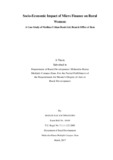Please use this identifier to cite or link to this item:
https://elibrary.tucl.edu.np/handle/123456789/2308| Title: | Socio-Economic Impact of Micro Finance on Rural Women |
| Other Titles: | A Case Study of Nirdhan Utthan Bank Ltd. Branch Office of Ilam |
| Authors: | Anchhangbo, Madan Raj |
| Keywords: | Rural women;Economic impact;Socio-economic condition |
| Issue Date: | 2017 |
| Publisher: | Central Department of Rural Development Tribhuvan University, Kathmandu |
| Abstract: | This thesis entitled Socio-Economic Impact of Micro Finance on Rural Women:A Case Study of Nirdhan Utthan Bank Ltd. Branch Office of Ilam, Nirdhan Utthan Bank Limited (NUBL) is the largest Microfinance Institution (MFI) in Nepal. It was established on 29th October 1998 under company act of Nepal. It started its formal operation from July 1999. NUBL provides microfinance services such as Loans, Deposits, Microinsurance and Remittance services to rural poor of Nepal. NUBL provides both group and individual loans. By January 2016, NUBL was providing microfinance services to more than 2,84,837 respondents in 75 districts of Nepal through its 178 branches, 10 regional networks, and headquarter. NUBL has recorded impressive growth during last few years and has been able to cover its costs. However, the impact of its services on the respondents has not been studied. The overall objective of the study was to measure the impact of the respondents. The conceptual framework was developed in accordance with the objective of the study. Similarly, the research questions were framed. The study followed both cross- sectional and longitudinal approach of comparison. Necessary documents reviews were done and the sample size determined accordingly. The general objective of this study is to analyze the role of Microfinance to uplift socio-economic condition of rural poor women of Nepal. As the selection of the study area and the research design, the sample size are selected because not all the service user respondents can be surveyed due to the physical as well as technical problems. This study is based on both primary and secondary data. Though this study is mainly based on primary data which is collected from the field study using questionnaire, group discussion and the observation method has been used. The area in where this study was undertaken is found composed by many castes and ethnicities, Brahmin, Chettri, Newar, Rai and other occupational castes. The area in where this study was undertaken is found composed by many castes and ethnicities, Brahmin, Chettri, Newar, Rai and other occupational castes. Overall the exit Respondents were found satisfied with the current services of NUBL and were willing to encourage their friends and relatives to join NUBL as well as were found willing to rejoin NUBL if their suggestions such as lowering interest rate, increasing the loan size, improving the staff behavior and reducing meetings are implemented Empowering women has been global concern and Nepal remains no exception. The ninth plan too, talks loudly about it. Poverty and no access to economic generating activities coupled with illiteracy and unawareness have rendered Nepalese women helpless mass. Empowering women through their economic independence is a positive step In this regard, women are still seen as one having secondary command over household management despite their high input. They are managers in household affairs but not controller of the management process. Social status remains a measuring rod through which an individual’s standing in society is determined. The study showed that superstitious and irrational approaches towards women have led to several forms of perversions in society. Equally, women have always been considered as inferior sex. The girls are found to have been taught to remain as silent spectator from their childhood. Micro-financing are focused on helping people who traditionally do not have access to such capital or services, making possible investments in small businesses that will generate income and make the populace self-sufficient. Also, it provides a long-term solution to some harsh characteristics of poverty, such as malnutrition, illiteracy, and inadequate housing. |
| URI: | http://elibrary.tucl.edu.np/handle/123456789/2308 |
| Appears in Collections: | Rural Development |
Items in DSpace are protected by copyright, with all rights reserved, unless otherwise indicated.

